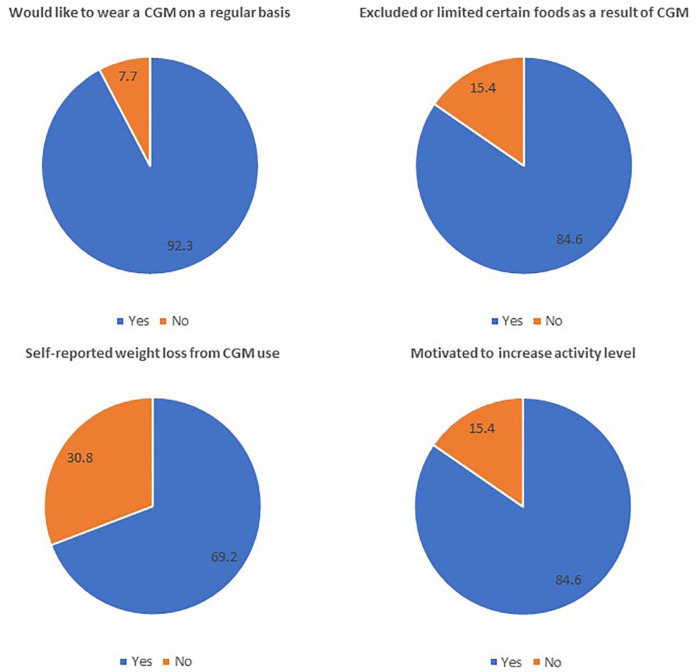Most research on real-time continuous glucose monitoring (RT-CGM) has examined the efficacy of this tool for hemoglobin A1c (A1c) management and hypoglycemia prevention in patients requiring multiple daily insulin injections (MDI), generally finding significant glycemic benefit for these patients.1,2 With the exception of the recently published MOBILE study 3 and our previous randomized controlled trial (RCT) on CGM in type 2 diabetes mellitus (T2DM), 4 little research exists on RT-CGM for patients not requiring MDI. Even less is known about whether RT-CGM supports patient self-care and sustains behavior changes, especially in ethnically diverse populations.
We conducted a prospective (14-week active intervention with 24-week follow-up interview) pilot study of patients (70% African American) with T2DM, not taking prandial insulin, to examine how RT-CGM relates to weight loss, glycemic indices, and patient perception of RT-CGM and lifestyle. Twenty-two adults received lifestyle counseling and wore a blinded CGM for 10-day sessions at weeks 0 and 14. Fifteen of the subjects were randomized to use RT-CGM (unblinded) for an additional 20 days (two sessions). The duration of RT-CGM use was based on previous research.5,6
Intention-to-treat analysis showed no differences between the treatment groups with respect to weight and glycemic indices. However, lifestyle factors (diet, in particular, as measured by the Starting the Conversation Food Frequency Questionnaire) improved and satisfaction with CGM (as measured by the Joslin Diabetes Center’s “Experiences with Continuous Glucose Monitoring [CGM] Diabetes” survey), which was high (mean score = 75.8/100; standard deviation = 9.3). Most participants felt that RT-CGM caused a sustained improvement in behavior and felt that RT-CGM contributed to a healthier lifestyle at 24 weeks (Figure 1). Forty-six percent reported ≥10 pounds weight loss since RT-CGM use and 100% reported that RT-CGM contributed to self-care. In the words of one participant,
I desperately wanted to find information that would not just help me manage the diabetes symptoms but give me leverage to reverse the symptoms. I spoke with my insurance company (after the study) to get help obtaining a CGM, for me it’s the start of me taking control of my health.
Figure 1.
Distribution of yes/no responses to week 24 survey about RT-CGM (n = 13, % shown).
Abbreviation: RT-CGM, real-time continuous glucose monitoring.
Other participants said similar things about the experience.
In our prior study with patients with T2DM not taking prandial insulin—who used RT-CGM cyclically but without lifestyle counseling and measurement of lifestyle—we showed that cyclic RT-CGM over 3 months produced an initial change in A1c that persisted after the intervention. 4 The reported lifestyle effect seen in this pilot study suggests that cyclic use of RT-CGM may be effective in changing self-care behaviors in those with T2DM, not on prandial insulin, particularly in the African American population. More frequent use of RT-CGM may result in more significant A1c improvement and/or weight loss.
In aggregate, these findings suggest that cyclic use of RT-CGM may be effective in improving glycemia, diabetes-related behaviors, and motivation in patients with T2DM not on MDI insulin, and that the impact of RT-CGM may be related to the duration of use. Future, larger studies need to include data on behavior effects and explore whether RT-CGM coupled with lifestyle counseling leads to sustained patient response.
Footnotes
Abbreviations: A1c, hemoglobin A1c; CGM, continuous glucose monitoring; MDI, multiple daily insulin injections; RCT, randomized controlled trial; RT, real-time; T2DM, type 2 diabetes mellitus.
Declaration of Conflicting Interests: The author(s) declared the following potential conflicts of interest with respect to the research, authorship, and/or publication of this article: Dr Ehrhardt received an investigator initiated grant from Dexcom for this project and is on an advisory board for Novo Nordisk. Dr Ehrhardt has also received educational grants from Novo Nordisk and Merck.
Funding: The author(s) disclosed receipt of the following financial support for the research, authorship, and/or publication of this article: This work was funded by DexCom, Inc.
ORCID iD: Michael Porter  https://orcid.org/0000-0001-9380-6625
https://orcid.org/0000-0001-9380-6625
References
- 1. Battelino T, Phillip M, Bratina N, Nimri R, Oskarsson P, Bolinder J. Effect of continuous glucose monitoring on hypoglycemia in type 1 diabetes. Diabetes Care. 2011;34(4):795-800. [DOI] [PMC free article] [PubMed] [Google Scholar]
- 2. Beck RW, Riddleworth TD, Ruedy K, et al. Continuous glucose monitoring versus usual care in patients with type 2 diabetes receiving multiple daily insulin injections: a randomized trial. Ann Intern Med. 2017;167(6):365-374. [DOI] [PubMed] [Google Scholar]
- 3. Martens T, Beck RW, Bailey R, et al. Effect of continuous glucose monitoring on glycemic control in patients with type 2 diabetes treated with basal insulin: a randomized clinical trial. JAMA. 2021;325(22):2262-2272. [DOI] [PMC free article] [PubMed] [Google Scholar]
- 4. Vigersky RA, Fonda SJ, Chellappa M, Walker MS, Ehrhardt NM. Short and long-term effects of real-time continuous glucose monitoring in patients with type 2 diabetes. Diabetes Care. 2012;35(1):32-38. [DOI] [PMC free article] [PubMed] [Google Scholar]
- 5. Yoo HJ, An HG, Park SY, et al. Use of a real time continuous glucose monitoring system as a motivational device for poorly controlled type 2 diabetes. Diabetes Res Clin Pract. 2008;82(1):73-79. [DOI] [PubMed] [Google Scholar]
- 6. Allen NA, Fain JA, Braun B, Chipkin SR. Continuous glucose monitoring counseling improves physical activity behaviors of individuals with type 2 diabetes: a randomized clinical trial. Diabetes Res Clin Pract. 2008;80(3):371-379. [DOI] [PMC free article] [PubMed] [Google Scholar]



